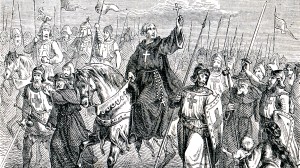In this series

1071Seljuk Turks defeat Byzantine armies at Manzikert1093-1109Anselm serves as archbishop of Canterbury1095-99The First Crusade1100Baldwin I becomes King of Jerusalem1113Crusader military order, the Hospitallers of St. John, recognized1115Bernard founds Cistercian monastery of Clairvaux1118Order of Knights Templar founded to protect pilgrims1121Abelard shocks theologians with his “Yes and No,” seemingly contradictory statements of theology1144Turkish chief Zengi takes Edessa from crusaders
First Crusade(1095–1099)Mission · Defend Eastern Christians from Muslim aggression. · Make pilgrimages to Jerusalem safer. · Redirect knights’ aggression.· Recapture the Holy Sepulcher.Leaders· Pope Urban II, who called for the crusade in November 1095.· Peter the Hermit, preacher who recruited a first wave of crusaders, mostly peasants.· Baldwin of Boulogne, Godfrey of Bouillon, and other French princes who led a second wave.Outcome
The first wave, an unauthorized “people’s crusade,” massacred Jews and plundered Eastern Christian territory, before being slaughtered by Muslims near Nicea in 1096.
A second wave, led by princes, moved into Asia Minor that summer and won strategic battles at Nicea and Dorylaeum. After a seven-month siege, Antioch was captured in June 1098.
With great violence the crusaders captured Jerusalem in the summer of 1099. Four crusader states were established in the Holy Land.
1145–48Second Crusade1155Carmelite order founded by 11 crusaders who live as hermits on Mt. Carmel1167-68Oxford University founded1169Saladin becomes vizier in Egyptc. 1173Peter Waldo, founder of Waldensians, begins to preach1174The tower of Pisa built1187Saladin’s forces crush Christian army at Hattin and take Jerusalem
Second Crusade(1145–1148)MissionTo regain crusader capital of Edessa, which had been overrun by Muslims in 1144.Leaders · Bernard of Clairvaux, revered monk, who preached the crusade.· King Louis Vll of France.· Emperor Conrad III of Germany.Outcome
Because of bickering and ineffective leadership, the German crusaders suffered a major defeat at Dorylaeum (1147). Badly weakened, the crusaders abandoned any hope of retaking Edessa.
Instead, they besieged Damascus. But following a strategic blunder they failed in their siege and were forced to retreat (1148).
Christians were devastated that a crusade preached by a moral exemplar and led by royalty would fail.
1187–1191Third Crusade1191Order of Teutonic Knights begins
Third Crusade(1187–1191)MissionTo retake Jerusalem, which fell to Muslim general Saladin in 1187.Leaders · Frederick Barbarossa, Holy Roman Emperor. · Philip II, King of France.· Richard I, later king of England.· Pope Gregory VIII.Outcome
Barbarossa (“Redbeard”) set out with an army in 1189 but drowned crossing a river en route.
In 1190, Philip II of France and Richard I (Lion-Heart) of England gathered their armies. On the way, Richard captured Cyprus from a rebel Byzantine prince. Meanwhile, Philip II laid siege to Acre, and after Richard arrived, it fell. Richard also took Jaffa and negotiated Christian access to Jerusalem.
1198–1204Fourth Crusade1199Innocent III attempts to launch first “political” crusade, against a German opponent1208Francis of Assisi renounces wealth1208–18Crusade against Albigensians, first against heretics in Europe1212Children’s Crusade, one of several popular uprisings that fails to reach Holy Land1215King John of England seals the Magna Carta. Fourth Lateran Council affirms transubstan-tiation1217Cambridge University founded
Fourth Crusade(1198–1204)MissionTo defeat Egypt, center of Muslim power.Leaders· Pope Innocent III.· Enrico Dandolo, Doge of Venice.· Byzantine prince Alexius IV.· Boniface de Montferrat.Outcome
The crusaders contracted with Venice, the shipping power, to sail them to Egypt. When they couldn’t pay the bill, the crusaders agreed to conquer for the Venetians a Christian city along the Adriatic Sea.
Then Alexius IV, son of the former Byzantine emperor, asked the crusaders to restore his father to power. In return he’d pay huge sums of money, reunite the Eastern church with Rome, and supply a crusade to the Holy Land. Most crusaders agreed, and against the pope’s orders, attacked Constantinople, the capital of Greek Christendom. When the restored Alexius couldn’t fulfill his promises, the crusaders attacked the city again. The resulting three-day massacre soured relations between Eastern and Western Christians for centuries.
The crusade never reached Egypt.
1217–21Fifth Crusade1225First cotton cloth made in the West1226Teutonic Knights commissioned to conquer and convert Prussia
Fifth Crusade(1217–1221)MissionTo defeat Egypt, center of Muslim power. Leaders· Pope Honorious III, who organized the crusade called for by his predecessor, Innocent III.· John of Brienne, early leader of crusaders.· Cardinal Pelagius, papal legate.Outcome
In 1218, crusaders successfully took a strategic tower in Uamietta, on the Nile. More troops arrived with Cardinal Pelagius, who assumed leadership. Though Muslims offered to give up the kingdom of Jerusalem, he continued the siege and took Damietta in 1221. Then an advance inland failed, forcing crusaders to retreat with nothing gained.
Only bright spot: during the siege of Damietta, Francis of Assisi crossed enemy lines to preach to the Muslim sultan.
1228–29Sixth Crusade1244New group of Muslims recaptures Jerusalem and defeats Christian settlers1244–50Pope Innocent IV crusades against Frederick II, one of many European political crusades
Sixth Crusade(1228–1229)MissionTo retake Jerusalem and the Holy Land.Leaders· Frederick II, Holy Roman Emperor.· Pope Gregory IX.Outcome
Frederick II, who had vowed to participate in the Fifth Crusade, pleaded illness as the Sixth set out, so the pope excommunicated him for not fulfilling his vow.
Nonetheless, Frederick joined the crusaders in the Holy Land and soon negotiated with Muslims for Christian access to Jerusalem (except for the Temple area). The treaty was denounced by the devout of both faiths and lasted but ten years.
Ironically Frederick was again excommunicated for making peace rather than pushing for military victory.
1248-50Seventh Crusade1253–68Pope Innocent IV launches a crusade against Conrad IV in Germany1261Byzantines reconquer Constantin-ople1263–71Muslim Baybars overrun Nazareth, Jaffa, and Antioch
Seventh Crusade(1248–1250)MissionTo defeat Egypt, Muslim political center.Leaders · Louis IX, King of France.· Pope Innocent IV.Outcome
As soon as he heard Jerusalem had fallen to Muslims, the devout Louis IX of France volunteered to lead a new crusade. After four intense years of planning, the well-financed army of crusaders took the Egyptian city of Damietta in 1249.
But on a subsequent move toward Cairo, Louis’s forces were surrounded, and he was taken prisoner. Louis was ransomed for a huge sum in gold and the city of Damietta.
Louis then went to the Holy Land for four years and rebuilt many Christian fortresses.
1267–72Eighth Crusade1271Marco Polo journeys to East1273Thomas Aquinas leaves “Summa Theologiae” unfinished1291Crusader forces defeated at Acre, and Christians expelled from the Holy Land
Eighth Crusade(1267–1272)MissionTo retake Holy Land fortresses and cities that had recently fallen to Muslims.Leaders· Louis IX, King of France.· Charles of Anjou, brother of Louis IX.· Prince Edward of England.Outcome
Louis’s second crusade got sidetracked into attacking Tunis in North Africa. Typhus and dysentery spread through the crusader camp, killing Louis. His brother Charles negotiated a treaty.
Edward arrived too late to join Louis. Still, he proceeded to Acre, where soon the crusade was abandoned.
In 1291, the crusader city of Acre fell, and the Christian presence in the Holy Land ended.
Copyright © 1993 by the author or Christianity Today/Christian History magazine. Click here for reprint information on Christian History.












